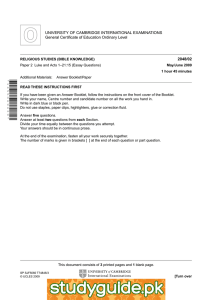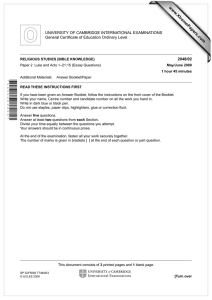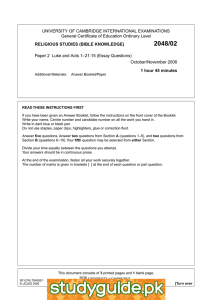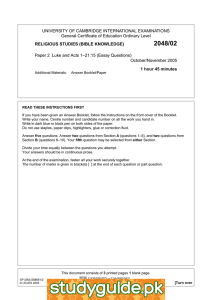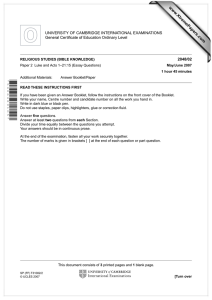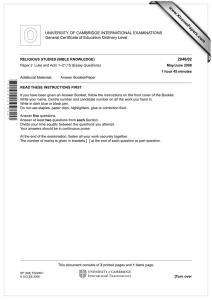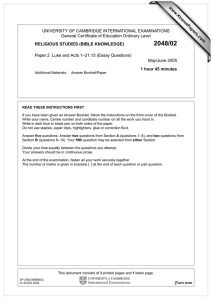2048/02
advertisement
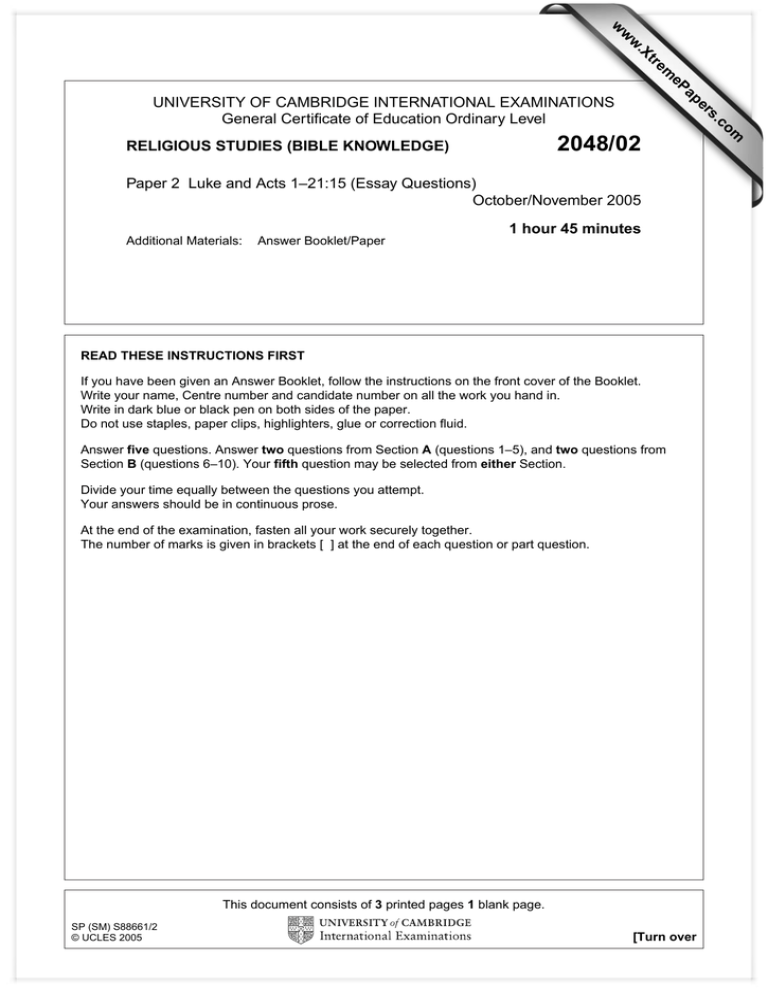
w w ap eP m e tr .X w 2048/02 RELIGIOUS STUDIES (BIBLE KNOWLEDGE) Paper 2 Luke and Acts 1–21:15 (Essay Questions) October/November 2005 1 hour 45 minutes Additional Materials: Answer Booklet/Paper READ THESE INSTRUCTIONS FIRST If you have been given an Answer Booklet, follow the instructions on the front cover of the Booklet. Write your name, Centre number and candidate number on all the work you hand in. Write in dark blue or black pen on both sides of the paper. Do not use staples, paper clips, highlighters, glue or correction fluid. Answer five questions. Answer two questions from Section A (questions 1–5), and two questions from Section B (questions 6–10). Your fifth question may be selected from either Section. Divide your time equally between the questions you attempt. Your answers should be in continuous prose. At the end of the examination, fasten all your work securely together. The number of marks is given in brackets [ ] at the end of each question or part question. This document consists of 3 printed pages 1 blank page. SP (SM) S88661/2 © UCLES 2005 [Turn over om .c s er UNIVERSITY OF CAMBRIDGE INTERNATIONAL EXAMINATIONS General Certificate of Education Ordinary Level 2 Answer five questions. Answer two questions from Section A (questions 1–5), and two questions from Section B (questions 6–10). Your fifth question may be chosen from either Section. Each question carries 12 marks. Section A The Life and Teaching of Jesus as Portrayed in Luke’s Gospel 1 (a) What happened when Jesus’ parents took him to the Temple when he was twelve years old? [7] (b) (i) Why had Jesus and his parents gone to the Temple on this occasion? (ii) Why was the age of twelve important to a Jewish boy? (iii) What was the significance of his visit to the Temple for Jesus? [5] 2 (a) Describe (i) how Jesus healed a woman crippled for eighteen years, (ii) the criticism of Jesus which resulted from this, and (iii) his response. [7] 3 4 (b) What does the incident teach about Jesus’ attitude to the Sabbath? [5] (a) Recount the parable of the Pharisee and the tax collector. [7] (b) What does this parable teach? [5] (a) Give an account of the conversation which followed when a certain ruler asked Jesus what he had to do to inherit eternal life. [7] (b) In his reply, what did Jesus teach about riches? 5 [5] (a) Describe what happened from the sixth hour until Jesus died. What happened immediately afterwards? [7] (b) Explain the significance of what was said by the two criminals crucified next to Jesus. © UCLES 2005 2048/02/O/N/05 [5] 3 Section B The Birth of the Church as Portrayed in the Acts of the Apostles Chapters 1–21:15 6 (a) Describe how the Holy Spirit was given to the disciples at Pentecost. [7] (b) What differences were there in the giving of the Holy Spirit at Pentecost and when it was given to the twelve men at Ephesus? [5] 7 8 9 (a) What happened at the Temple gate called Beautiful (RSV Beautiful Gate) when Peter and John met a crippled man? [7] (b) Discuss the importance of the miracles of healing recorded in Acts. [5] (a) Explain why Saul went to Damascus, what authority he had and how he obtained it. [7] (b) How was Saul changed by his experience on the road to Damascus? [5] (a) Give the main points of Paul’s speech to the people of Athens. [7] (b) How did Paul’s speech at Athens differ from those he gave in other places? [5] 10 (a) What is known about Apollos and his background? (b) How was he helped by other Christian believers, and how did he assist the church? © UCLES 2005 2048/02/O/N/05 [7] [5] 4 BLANK PAGE Permission to reproduce items where third-party owned material protected by copyright is included has been sought and cleared where possible. Every reasonable effort has been made by the publisher (UCLES) to trace copyright holders, but if any items requiring clearance have unwittingly been included, the publisher will be pleased to make amends at the earliest possible opportunity. University of Cambridge International Examinations is part of the University of Cambridge Local Examinations Syndicate (UCLES), which is itself a department of the University of Cambridge. 2048/02/O/N/05
